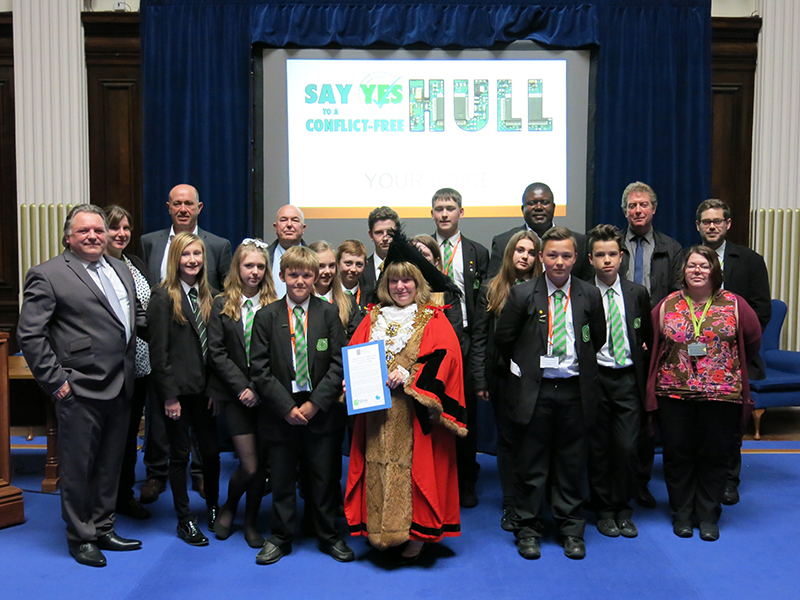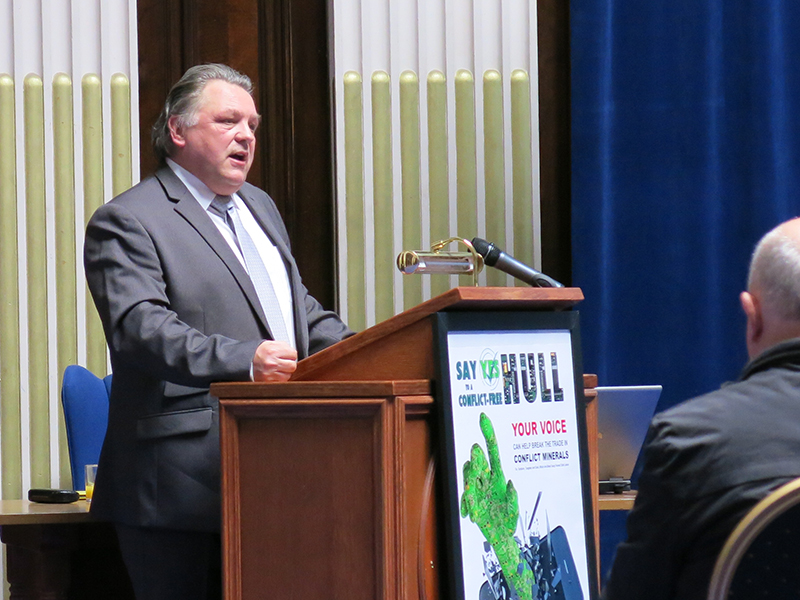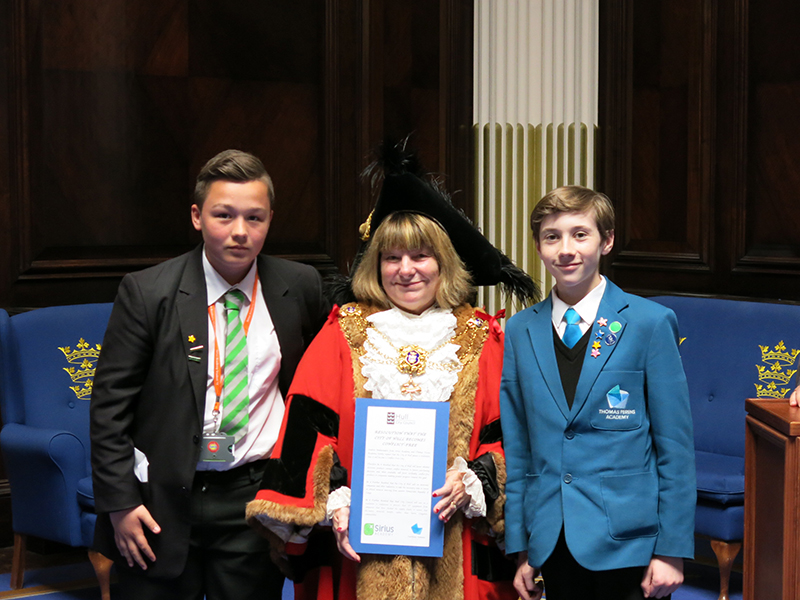
Editor's Note: This post was written by Mike Riley, leader of the Conflict-Free Hull Campaign.
On Thursday 18th June 2015, I was sitting in the council chamber at the Guildhall in Kingston-Upon-Hull, fingers crossed, quite nervous and excited at the same time in eager anticipation of the next item on the council agenda. Alongside me I had 24 student ambassadors between the ages of 11 and 12 years old as well as six teachers and support staff from two of Hull’s largest academies – Sirius Academy and Thomas Ferens Academy. This council meeting was the culmination of six months hard work, not just by myself but by all the students, teachers and councillors who had taken part in an extensive campaign for Kingston-Upon-Hull to be the first city in the UK to pass a conflict-free resolution.
Eight different councillors stood and addressed the council chamber about our campaign. They highlighted the illegal mining of conflict minerals – tin, tungsten, tantalum and gold, often referred to as 3TG – from the Democratic Republic of the Congo. The support and acknowledgement of all our hard work by these leading city officials was humbling, each of them delivering passionate speeches (see video begeinning at 1:06:00) drawing attention to forced child slavery, child soldiers, and the suffering of the Congolese people who would see very little benefit from the trade in these natural resources.
These councilors – allies to our cause and staunch supporters of our campaign – were delivering the message that, as a large consumer and holder of major electronics purchasing contracts, passing the resolution would mean Kingston-Upon-Hull was expressing a preference for conflict-free electronics worth millions of pounds. This change in procurement policies would encourage and motivate the electronics industry and associated companies to take a stand against conflict minerals, and to do more to source minerals that benefit Congolese communities rather than fuel the cycle of slavery, rape, and war.
 Whilst listening to these compelling speeches, my mind wandered back to the start of our campaign: an ambitious project to not only educate the young school children of the city with regard conflict minerals, but to also encourage these young students to use the ‘Power of Voice’ to influence electronics manufacturers through the strength of consumer opinion. These school children are the new driving force behind the purchase of mobile phones and electronics devices, and by speaking out they are delivering a message directly to the manufacturers of electronics products that they must address the problem of conflict minerals and work to clean up their supply chains so that Congolese people can see the benefit of their country’s riches.
Whilst listening to these compelling speeches, my mind wandered back to the start of our campaign: an ambitious project to not only educate the young school children of the city with regard conflict minerals, but to also encourage these young students to use the ‘Power of Voice’ to influence electronics manufacturers through the strength of consumer opinion. These school children are the new driving force behind the purchase of mobile phones and electronics devices, and by speaking out they are delivering a message directly to the manufacturers of electronics products that they must address the problem of conflict minerals and work to clean up their supply chains so that Congolese people can see the benefit of their country’s riches.
This campaign is not about prohibiting mineral exports from Congo. Mining is critical to the livelihoods of many Congolese people, so it is essential that the mining of these minerals continues. With an abundance of minerals, Congo should be prosperous. It is one of the richest countries on the planet in terms of natural resources, yet remains one of the poorest by economic standards.
I conducted a survey with both school children and adults that concluded a problem existed amongst the UK population with regards to understanding 3TG conflict minerals. The majority of adults and school children surveyed declared that the only conflict mineral they were aware of was conflict diamonds. They were unaware of where and how 3TG minerals were mined and in what products these minerals were eventually used. So my campaign became a multi-faceted project, intended to not only help educate young school children with regard the connection between slavery, conflict minerals, and electronics devices, but also for the children of Hull to be part of a campaign that would help them raise their voice, and create awareness amongst local MPs, city officials, and heads of business about the dreadful suffering of children of their same age in Congo.
In the council chamber the speeches concluded. The school children of Sirius and Thomas Ferens were thanked by the Lord Mayor and now sat with baited breath for the resolution to be put to a vote. I was doing the math in my head: we needed a majority to get the motion passed, 49 councillors were voting, so we needed 25 votes. Had we done enough? Had we been persuasive enough in our arguments? Were we expecting too much that a campaign consisting of myself and 24 student ambassadors could take on a major city in the UK and influence how they procured millions of pounds of electronics equipment?
The Lord Mayor of the city of Kingston-Upon-Hull asked the councillors to vote. The electronic screens in the council chamber sprang to life and my eyes focused on the ‘yes’ vote. I was mentally willing it to climb, please let it be passed. For what seemed to be an age, nothing happened. And then the numbers appeared, flickering: 10, 22, 37, 49. I sat in stunned silence for a minute and tried to comprehend what had happened – our resolution was passed not just by a majority, but unanimously, with every council member from every political party joining together to show their solidarity behind our resolution by voting yes.
 Kingston-Upon-Hull, birthplace of William Wilberforce who was a leader in the movement that abolished slavery in 1807, had now again made history by becoming the first city in the UK to pledge and resolve to be conflict-free. I held back tears as the council chamber applauded our small group of warriors. I felt my young, dedicated campaigners were not even fully aware of what they had achieved and the difference this resolution would make. I was proud of every one of them, young ambassadors who had dedicated their own time to make a difference. It was an honour and privilege to be their leader.
Kingston-Upon-Hull, birthplace of William Wilberforce who was a leader in the movement that abolished slavery in 1807, had now again made history by becoming the first city in the UK to pledge and resolve to be conflict-free. I held back tears as the council chamber applauded our small group of warriors. I felt my young, dedicated campaigners were not even fully aware of what they had achieved and the difference this resolution would make. I was proud of every one of them, young ambassadors who had dedicated their own time to make a difference. It was an honour and privilege to be their leader.
So what next? This was just the first step, albeit an important one. We now have MPs and the UK parliament to lobby, businesses in Hull get signed up to a similar pledge, consultations with regard the rewriting of the procurement process, and other cities throughout the UK to campaign as well. An exciting journey lies ahead and many more campaigns need to be won, however Kingston-Upon-Hull will always be a shining star and a beacon of hope.
During our campaign some people suggested we were being too ambitious, that we should scale back our expectations. However at 1:06pm on June 18th, we showed the world what could be achieved.
Photos from the Hull city council meeting on June 18th, 2015.

